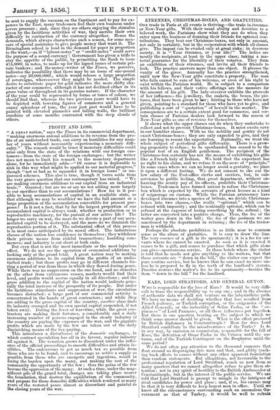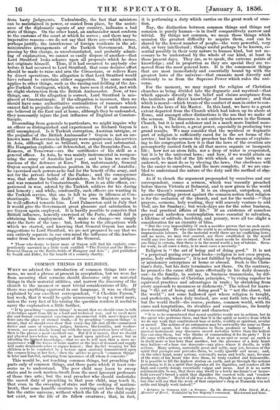KARS, LORD STRATFORD, AND GENERAL GUTON.
Wino is responsible for the loss of Kars ? It would be very diffi- cult to trace the responsibility up to any one ; and in the absence of authentic data we shall not venture on the labyrinthine path. We have no means of deciding whether that loss resulted from French jealousy, or Turkish corruption, or the exigencies of the Allied Generals or the imbecility of Selim Pasha, or the " su- pineness" of Lord Panmure, or all these influences put togethes. But there is one question bearing on the subject to which we think some answer should be given. What is the effect produced by British diplomacy in Constantinople ? How far does Lord Stratford contribute to the misadventures of the Turks ? Is he in any way, by omission or commission, responsible for the fall of Kars, the detention of Omar Pasha in the Crimea until the au- tumn, and of the Turkish Contingent on the Bosphorus until the same period ? We do not often pay attention to the thousand rumours that float around us disparaging this man and that, and glibly track- ing back effects to causes without any other apparent foundation than random statements. But allegations, not favourable to the professional reputation of Lord Stratford, reach us now from so many quarters that we cannot altogether refuse to give them at- tention ; not in any spirit of hostility to the British Ambassador at Constantinople, but in the interest of the public service. We are told that Lord Stratford is prompt to mingle in the intrigues of rival candidates for power and place ; and, if so, his excuse may be that it is very difficult to keep honest men in office. Until we know all the circumstances surrounding such an anomalous Go- vernment as that of Turkey, it would be well to refrain from hasty judgments. Undoubtedly, the fact that ministers can be maintained in power, or ousted from place, by the assist- ance of the diplomatic agents of any country, indicates a bad state of things On the other hand, an ambassador must conform to the customs of the court at which he serves ; and there may be imperative reasons—we do not say that there are—which excuse, perhaps justify, the interference of foreign residents in the ad- ministrative arrangements of the Turkish Government. But, passing by this charge, as unsubstantiated, and probably admit- mg of explanation, we cannot so easily dispose of another—that Lord Stratford looks askance upon all proposals which he does not originate himself. Thus, if it had occurred to anybody else before it had occurred to Lord Stratford, that some decisive effort should be made to raise and arm the Circassian, or relieve Kars by direct operations, the allegation is that Lord Stratford would have refused to entertain either suggestion. The same remark applies to other things, such as the raising and drilling of the An- glo-Turkish Contingent, which, we have seen it stated, met with no slight obstruction from the British Ambassador. Now, of two things, one. If the allegation is correct, Lord Stratford is mis- placed at Constantinople. If thwallegation is incorrect, then we should have some authoritative contradiction of rumours which cannot fail to prejudice the public service. For if such rumours are believed in the East and at home, although they be unfounded, they necessarily injure the just influence of England at Constan- tinople.
Descending from generals to particulars, we might inquire why an officer so distinguished and experienced as Richard Guyon is still unemployed. Is it Turkish corruption, Austrian intrigue, or the prejudice of the British Ambassador ? Guyon is not an un- known man. His services in Hungary were conspicuous ; his services in Asia, although not so brilliant, were great and substantial. His Hungarian exploits—at Schwetchat, at the Branyisko Pass, at Komorn, at Temeswar—are the certificates of his skill as a general officer. In Asia, he was mainly instrumental in reorgan- izing the army of Anatolia last year ; and to him we owe the nucleus of the defences at Kars. But, unfortunately, General Guyon occupied an anomalous position in the army of Anatolia : he exercised such powers as he had for the benefit of the army, and not for the private behoof of the Pashas ; and the consequence was, that after the battle of Kurukdere, he fell by an intrigue, and was remanded to Constantinople. Here is an able officer, ex- perienced in war, adored by the Turkish soldiers for his daring and honesty ; and while, confessedly, such officers are wanting in the Turkish service, this one is left to pine in idleness at Con- stantinople. Whose the fault ? Our own Ministers seem to be well-affected towards him. Lord Palmerston said in July that it would give the Government great pleasure and satisfaction to see Guyon again employed. It is hardly possible to conceive that British influence, honestly exercised at the Porte, should fail in obtaining him employment. We make no charge—we simply state the facts of the case : but, looking to the allegations with which we started, and knowing that General Guyon has made suggestions to Lord Stratford, we are not prepared to say that we can entirely separate in our own mind the influence of the Ambas- sador from the non-employment of the General.
* Those who desire to know more of Guyon will find his exploits com-
ndiously narrated in a little work entitled "The Patriot and the Hero- tneml Guyon on the Battle-fields of Hungary and Asia" ; just published by Smith and Elder, for the benefit of a country charity.











































 Previous page
Previous page